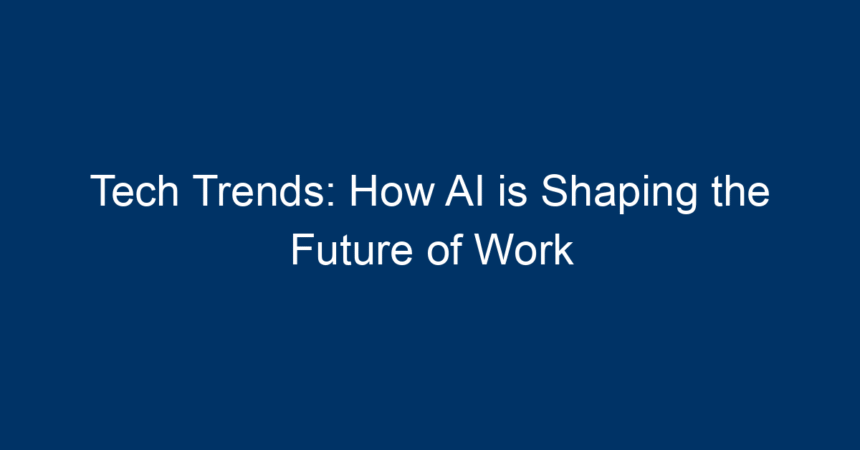In the fast-evolving landscape of modern employment, technology stands as a beacon of innovation and disruption. Among the myriad of advancements, artificial intelligence (AI) has emerged as a transformative force that is reshaping the workplace. From automating mundane tasks to enhancing decision-making processes, AI is not just a tech trend; it’s redefining how we approach our jobs and the skills we need to thrive. In this article, we will explore key tech trends related to AI and how they are influencing the future of work.
The Rise of AI in the Workplace
Understanding AI’s Role
As businesses increasingly integrate AI technologies, the workplace is transitioning to a model where machines and humans coexist harmoniously. AI’s capabilities range from natural language processing and data analysis to machine learning and robotic process automation. According to a report from McKinsey, AI could potentially add $13 trillion to the global economy by 2030, significantly impacting various industries.
Automating Routine Tasks
One of the most immediate effects of AI on the workplace is the automation of routine tasks. For instance, AI-driven chatbots handle customer inquiries, freeing up human employees to focus on more strategic initiatives. This shift is not merely about replacing jobs; it’s about enhancing productivity and allowing workers to engage in more fulfilling tasks. As a result, companies are more efficient and workers can cultivate their skills in areas that require critical thinking and creativity.
AI and Decision Making
Enhanced Data Analysis
AI’s capacity for data analysis plays a crucial role in informed decision-making. Leveraging predictive analytics, AI systems can sift through vast datasets to identify trends and provide actionable insights. This is particularly valuable in sectors like healthcare, finance, and marketing where data-driven decisions can dictate success. For example, businesses in the retail sector can utilize AI to forecast inventory needs, optimizing their supply chains and minimizing waste.
Real-Time Feedback for Continuous Improvement
Another notable trend is the ability of AI to provide real-time feedback. AI tools analyze employee performance metrics, offering immediate suggestions for improvement. This ongoing feedback loop fosters a culture of continuous learning, allowing team members to adapt and grow. As organizations increasingly prioritize agility and responsiveness, tech trends like this make adaptability a core competency.
AI in Employee Engagement and Training
Personalized Learning Experience
Tech trends in AI also extend to employee development and training. Traditional approaches to training are often one-size-fits-all, but AI technologies can tailor learning experiences to individual employee needs. Machine learning algorithms assess an employee’s skills, training history, and career aspirations to provide customized learning pathways. This not only boosts engagement but also accelerates development, helping employees acquire skills that are aligned with both their interests and the organization’s needs.
Fostering Collaboration
AI tools create platforms for enhanced collaboration among teams. With AI-powered project management tools, employees can track progress, set priorities, and communicate effectively. These tools help break down silos, making it easier to share knowledge and foster a sense of teamwork, even in remote work settings. This trend aligns with the broader shift toward agile work environments, where adaptability and collaboration are prioritized.
The Ethical Considerations of AI in the Workplace
Addressing Job Displacement
As AI continues to evolve, concerns about job displacement and workforce inequities are paramount. It’s crucial for businesses to consider the ethical implications of AI integration. Strategies like reskilling and upskilling can alleviate the fears associated with job loss. Organizations can invest in training programs to help employees transition into roles that complement AI technologies, ensuring that the workforce remains relevant and valuable.
Data Privacy Concerns
With the deployment of AI comes the responsibility of handling data ethically. Companies must navigate the complexities of data privacy while utilizing AI to analyze employee performance or customer behavior. This means ensuring transparency in how data is collected and used, and adhering to regulations like GDPR. Establishing a framework for responsible AI use can build trust among employees and customers alike.
Future-Proofing Your Career in an AI-Driven World
Embracing Lifelong Learning
In light of these tech trends, individuals must adopt a mindset of lifelong learning. Developing new skills and expanding one’s knowledge base will be critical for staying relevant in a rapidly changing job market. Online courses, webinars, and workshops can provide valuable resources for honing skills that complement AI technologies.
Focusing on Soft Skills
While technical skills are essential, soft skills like emotional intelligence, creativity, and critical thinking will become increasingly valuable. As AI automates routine tasks, the ability to collaborate, empathize, and innovate will set individuals apart in the job market. Employers are seeking candidates who can enhance teamwork and foster a positive workplace culture. Focusing on these skills can provide a competitive edge.
Networking in an AI Ecosystem
Building a professional network is another fundamental strategy for future-proofing your career. Attending industry conferences, participating in online forums, and connecting with thought leaders can open doors to new opportunities. Engaging with communities that focus on AI and tech trends allows individuals not only to learn but also to share insights and collaborate on innovative projects.
Conclusion: Navigating the AI Revolution
As we stand on the cusp of a new era defined by tech trends, the influence of AI on the future of work is undeniable. Embracing the changes brought by AI technologies can unlock efficiency, foster collaboration, and enhance decision-making. However, it is also essential to address the ethical considerations and prepare for the workforce’s evolution.
By committing to lifelong learning, honing soft skills, and building networks, individuals can thrive in this AI-infused workplace. Organizations must also take strategic steps to reskill their workforce and maintain an ethical approach to AI implementation. Together, we can navigate the AI revolution and create a future of work that is both promising and sustainable.
Actionable Insights
- Invest in Learning Resources: Explore online courses and workshops focused on AI and emerging technologies.
- Focus on Soft Skills Development: Emphasize emotional intelligence, communication, and teamwork in your career development.
- Engage with Professional Networks: Join industry groups and attend conferences to stay updated with tech trends and build connections.
- Advocate for Ethical Practices: Promote responsible AI use within your organization to ensure fairness and transparency.
By understanding and embracing these tech trends, we can each play a role in shaping a future of work that is innovative, inclusive, and driven by human potential.




